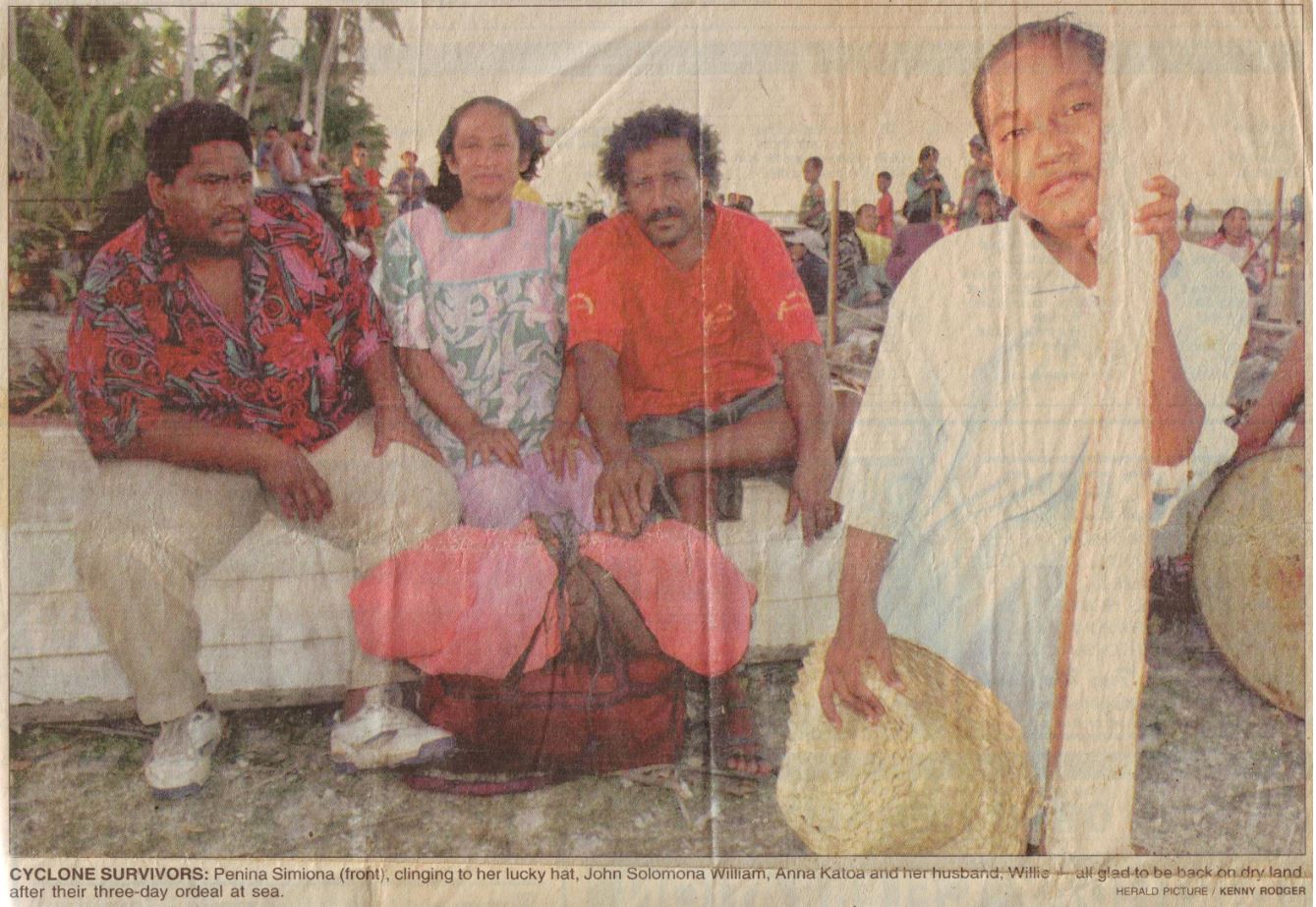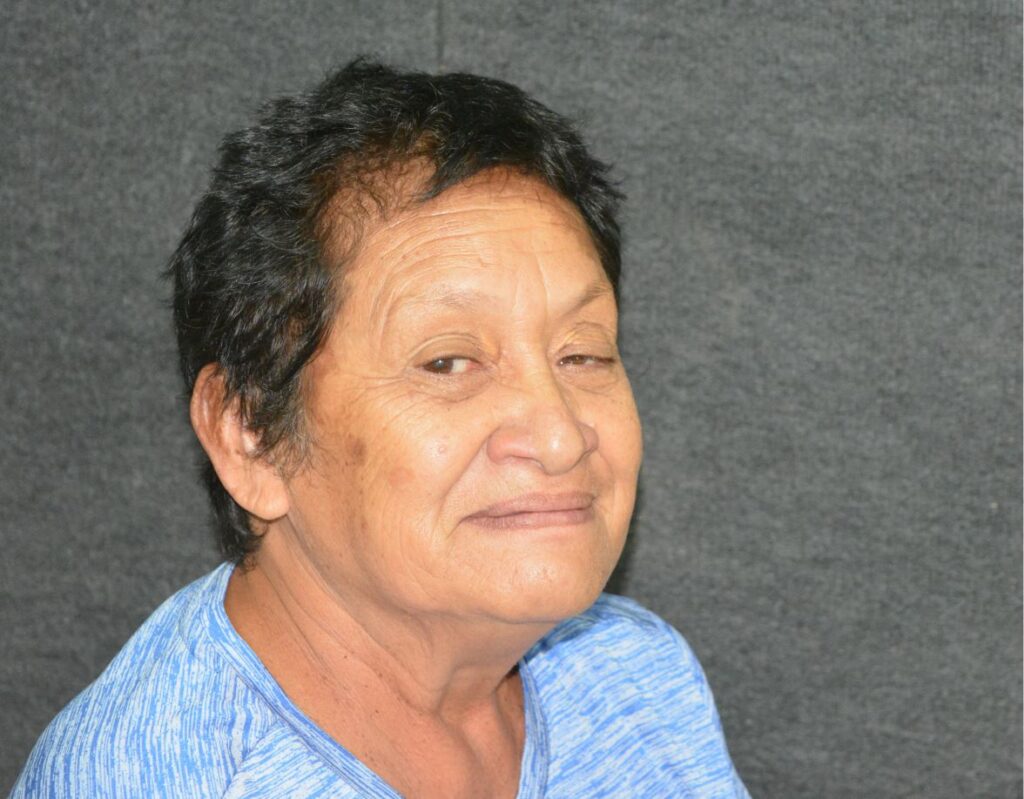‘We are resilient’
Tuesday 1 November 2022 | Written by Melina Etches | Published in Local, Memory Lane

Cyclone Martin survivors: Penina Simiona (in front) clinging to her lucky hat, John Solomona William, Anna Katoa and Willie Katoa. Picture: HERALD - KENNY RODGER/ 22103110
On November 1, 1997, Cyclone Martin struck the island atoll of Manihiki with waves higher than the highest coconut tree, claiming 19 lives. Today marks the 25-year anniversary of the destructive cyclone – the most catastrophic storm to hit the Cook Islands. Anna and Willie Katoa and their daughter Katarina are some of the survivors. Ana was five months pregnant when the waves struck, tragically they lost their seven-year-old daughter Maureen (older Maureen) who was presumed drowned. ‘Resilience’ is the word that springs to Anna’s mind when she emotionally recollects the surreal fight for survival during their three days at sea from the devastation of Cyclone Martin.
The first of November “really brings home the day of what happened (Cyclone Martin) like re-living what had happened,” says Anna.
“But every day is a reminder of Cyclone Martin. If I see waves, rough seas, matangi (wind) and the rain … it reminds me of that time.
“It doesn’t go away, like now it still hurts, its painful, but I thank the Good Lord that we are still alive, but I wish that my daughter was alive as well, that she lived through it.
“You know you can never (forget) … if you’ve been through something like that you can never forget, there will always be something around you that will trigger it, every day of your life.”

The Katoa family lived 50 metres away from the lagoon.
She remembers seeing the wave before it got dark that Saturday evening. “When we got it, we were just talking and then we said ‘Oh there’s a wave’ and we just happened to turn and we got hit by it…”
Anna, her husband Willie and their two girls Maureen (seven years) and Katarina (five years) were swept into the lagoon.
“We came up and there were people being thrown by the waves, things were flying and we saw Papa holding onto a plank.
“Ririnui te matangi (strong winds) e koko te tai (strong currents), we were thinking what are we going to do when Willie happened to see a boat come past, luckily it was dragging because the winds were strong. He grabbed the boat and we got on. We had lost Katarina when we were swept away in the lagoon, we only had Maureen.”
A young girl Penina Simiona appeared whom they called out to join them, and their Uncle Teira.
Uncle Teira wasn’t himself, says Anna because he had lost his granddaughter.
During the night the boat tipped upside down, they had lost Papa Teira and couldn’t see Penina.
“It ended up the two of us the whole night, Willie tied me to the motor shaft of the boat, I was pregnant and he told me to stay there.”
The next morning Willie saw John Solomona holding onto a floating object and called him over.
John and Willie managed to up-right the boat, and discovered Penina. She had sheltered under the boat throughout the night.
“We never knew she was there… she’d had an air pocket underneath to breathe,” says Anna.
The four drifted on the ocean, refusing to lose hope.
They collected uto, nu and coconuts that went past and grabbed a sleeping bag that served as a sail and planks of wood as a mast.
“It’s the instinct that we have to survive. And we were lucky Willie knew the current, he knew the wind directions and he knew the birds.
“Willie said, if we miss Rakahanga, we’ll try for Penrhyn.”
After three days at sea they saw birds.
“Lucky he saw the birds, he said, ‘e aere nei tatau ki Rakahanga’.”
“With Penina on one side and me on the other side, me karanga uti e uti, we would pull the sleeping bag to spread out like a sail. When we were told to relax, we did, then pull the makeshift sail up again to pick up the wind and Willie just had a wooden plank to steer the boat.”
Surfing the waves towards the shore of Rakahanga, Anna says they were lucky the sea was quite calm.
They landed on the school side of the island and walked to the village.
“People freaked out, thinking we were ghosts, I think it was because of the way we looked and the way we were walked…”
On Rakahanga, Willie received stiches for a cut he had on his leg. At sea he had managed to stop the bleeding by chewing the “kiko nu” which helped.
Thankfully Katarina was found the day after the waves hit Manihiki, clinging onto a tree.
“We never found little Maureen,” says Anna.
“Willie believed she was still there in Manihiki but due to a medical ailment he couldn’t dive again to keep looking for her” – which is one of the reasons why they left the island.
“One thing that we have learnt or I have learnt is that, we are resilient, resilient in a way that we are here to survive.
“Whereas some people may give up. We try our best to live. We don’t give up, we were looking for things that would help us survive like grabbing planks of wood, coconuts, containers to catch rain water and anything… to survive.”
On March 12th 1998, Anna gave birth to her son whom they named Moana in memory of Cyclone Martin.
Another child, a daughter was born in 2000 named Maureen – after little Maureen whom they had lost.
Cyclone Martin continues to serve as a reminder for people and government that it is especially those low-lying atolls in the North who are more vulnerable.
And Anna says: “It is best to be prepared but you can never really be prepared for the unexpected. But the instinct to survive kicks in.”
President of the Manihiki Community on Rarotonga, Apii William says a memorial service will be held at 6pm this evening at the Manihiki Hostel to remember those who were lost – who will never be forgotten – and those who survived and the people of Te Fuinga O Niva.












































